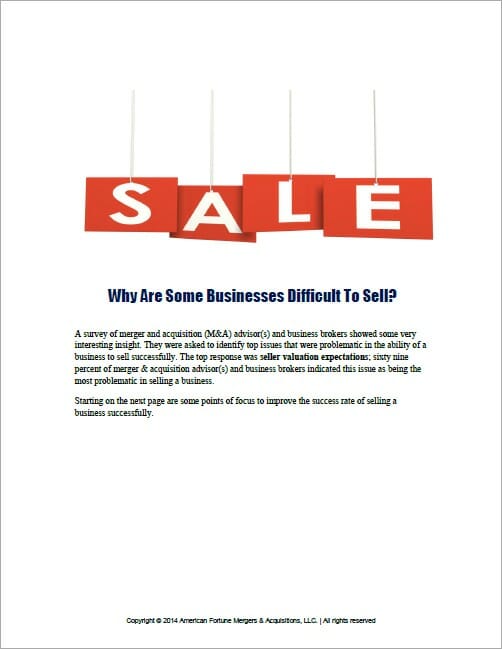Help in Selling My Business
Prior to obtaining help in selling a business I found out that selling my business was a complex issue, and there is no one right answer for everyone. One option is doing all the work of selling a business by myself. You might be thinking that if you combine a bit of internet research with your own business smarts you can handle both getting the business advertised for sale and the actual selling of the business and convincing a buyer into seeing that your business is a great opportunity for them. However, selling a business is a lot different than running one; and it’s a lot different from selling a house. Business buyers are not just buying your physical assets; they want to know that all aspects of your business are in legal order, and they want to know that the key facts and methods of your operation are not all locked in your head. Buyers are bound to ask a lot of questions and take a lot of your time, and only some of them will know what they are doing, what they are looking for, and what they are looking at; others will be wasting your time because they are unprepared to purchase or run your business. And on top of that, the most well-funded buyers may very well take their money elsewhere because they are impatient for accurate and informative answers to questions for which you never thought to be prepared.
It also can be embarrassing and depressing to find out in the middle of talking with potential buyers, that your business does not seem to be worth as much as you thought because it is not strategically prepared for the sustainability and growth needed to withstand against competitors and shifting markets. Everything may be working for the moment, but buyers are looking ahead and they want a business which will go far beyond repaying their investment. I turned for help in selling my business and found better options to successfully handle the process of selling a business.
As I considered help in selling my business, I found that the best option was to hire a Business Broker or a Merger and Acquisition Adviser to assist in preparing and selling my business. I realized that my business was the most valuable thing you are likely to ever sell, and hiring Business Broker or a Merger and Acquisition consultant is an investment which pays you back by maximizing your business’s value, ensuring you don’t come out on the short end of the deal, and greatly reducing the risk of costly issues and surprises. Working with a good Business Broker or M&A Adviser might mean not having to settle for a lower selling price because they can help you see your business from a buyer’s perspective, and spot ways to improve key aspects of your business to make it more reliable, hence more valuable to buyers.
My first step in finding help in selling my business I performed research and reviews for choosing the best Business Broker or M&A Adviser. I then chose a reputable Merger & Acquisition Adviser for the preparation and processing the sale of my business. In my use of a M&A Adviser, I was presented with tasks and processes and the areas that I could assist with and the areas that M&A Adviser would be most helpful. This kind of al a-carte service approach is a compromise which can work for some people, saving you money while keeping you from having to face all the unknowns and complications of selling a business on your own.
You might assume that because your business is making enough money to comfortably pay your own bills and make payroll regularly, that it is in a good enough condition to be attractive to buyers. Maybe you even know someone you think might be willing to buy you out and take over running the business. But probably neither you nor your friend have actually crunched the numbers on how that deal might work. Taxes on the sale of your business would cut into the size of the net payments you would be able to enjoy, interest would make it harder for your buyer to pay off the full amount, and you would no longer be able to control how the business is run. What if the new owner is not up to handling the work or the stress, or customers and suppliers don’t like him as well as they liked you? What if revenues drop and the new owner starts missing payments to you? Would you be sucked back into helping to run the business, or have to go looking for a job when you expected to be enjoying retirement? The solution is in planning and strategizing to prepare your business so that it will be attractive to a buyer who has the experience and resources necessary to properly manage the purchase and the operation of the business you’re selling. And that is an area in which a Business Broker or M&A Adviser can really help, with advice on exit planning, preparation, and buyer screening.
As I utilized help in selling my business, the first step was to find out what my business was worth to buyers in the market.
A buyer might see strategic value in combining ownership of your business with their other endeavors, for market share or for keeping profits in-house. But the majority of small-business buyers are either investing for simple profit returns or are buying a livelihood. They are looking for something that works, not a set of ideas and hopes, so you can’t expect a higher price just because you believe in your business’s unrealized potential. Of course you want buyers to see potential, but they will only pay for what has been realized.
Because buyers are more interested in the size of profits than the value of assets, a standard starting point for calculating the value of a small business is to use a multiple of “seller’s discretionary earnings.” Rather than relying on what you chose to pay yourself, this involves recalculating all owner’s salary and perks into the profit-and-loss statements to find the true discretionary profits of the business, then comparing that to data for businesses similar to yours, and multiplying by a number standard to your type of industry. But there are many factors which make Business Valuation part science and part art, where experience plays an important roll in producing a reliable and defensible valuation.
The second step in seeking help in selling a business the M&A Adviser showed my how to improve my business from a buyer’s perspective.
The process for improving the business and it value is called “exit planning.” In the exit planning process you are making adjustments to your business like divesting of outdated inventory by selling it at a loss, investing to update equipment, and investing in incentives to make a strategic new client or customer, will all make your business appear more attractive to buyers, but at the same time it will negatively effect your year’s profit and loss statement which will look considerably less attractive to buyers. The solution is to make the needed improvements and clean-up, but then give your business some time (maybe another six months to a year) to recover from the expenses so that your business will again be showing a healthy profit when viewed by prospective buyers. A good M&A Adviser can help you with Exit Planning–giving you valuable advice on what your particular business needs to do.
In my quest for help in selling my business I learned from the M&A Advisor how to prepare and present the facts.
Basic paperwork a buyer will want to see includes:
- Profit and Loss statements, for the last three years plus current year-to-date.
- Balance Sheets, for the last three years plus current figures.
- Invoices and deposit receipts or bank statements to substantiate income.
- All contracts (suppliers, customers, talent, etc.).
- Equipment and property leases, rent agreements, and appraised property deeds.
- List of equipment, furnishings, and other assets, with depreciated values.
- Detailed inventory.
- Insurance policies.
- Intellectual property documentation.
- Copies of all tax forms filed for the last three years.
- Written outlines of practices and procedures used in your business.
An experienced Business Broker or M&A Adviser can look at your unique business and tell you what additional documentation you should have ready to show potential buyers.
In my quest for help in selling my business I learned the following points.
The bad news is that selling your business for all it’s worth is not an overnight thing. The good news is that you can get an expert to help, who will not only do a lot of the work for you, but will earn his or her pay by maximizing your ROI and smoothing the whole process.
Remember, that while articles like this one can help you get started by giving you basic information on how to sell a business, there’s no substitute for consulting with an experienced Business Broker or M&A Adviser about your specific business situation and your own personal goals.
For more information see:
- The Difference Between Business Brokers, Merger and Acquisition Advisers & Investment Bankers https://www.fortunebta.com/business-brokers-merger-and-acquisition-advisors-investment-bankers/
- The Value of a Good Merger and Acquisition or Business Broker (including “Some questions to ask when choosing a Business Broker to sell your business”) https://www.fortunebta.com/value-good-business-broker/
- Help in selling a business an M&A Company https://www.fortunebta.com/choosing-ma-company/







